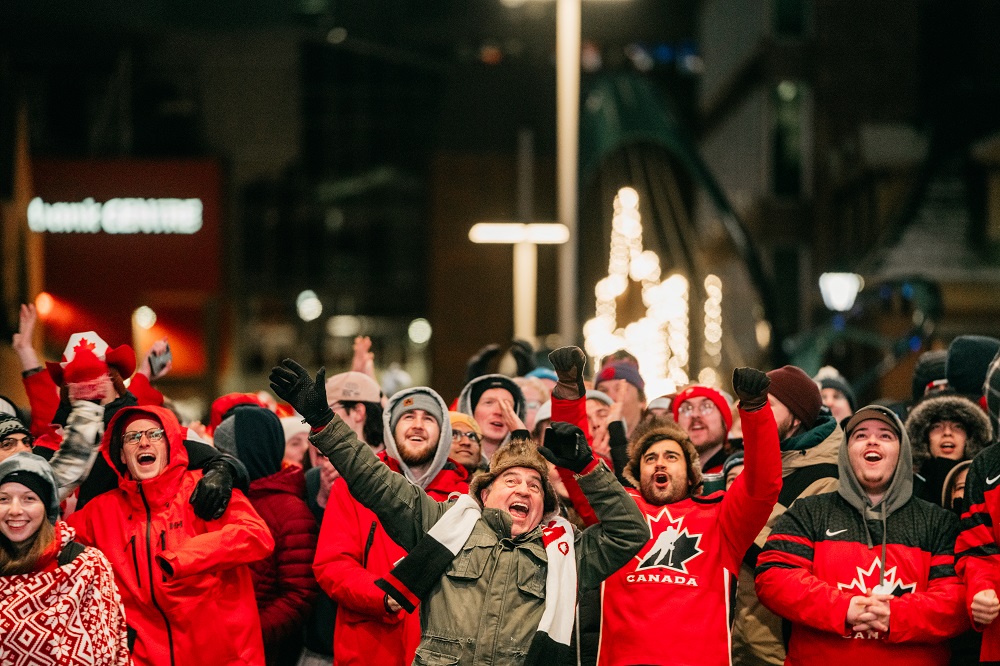Sport Tourism’s Biggest Challenges and Brightest Opportunities
By Angela Kryhul
OUR CONTRIBUTORS
Joel Cowley, CEO, the Calgary Stampede organization
Micah Desforges, founder & CEO, Tribu Expérientiel
Benoit Girardin, CEO, LBB Strategies
Wayne Long, manager of economic growth & attraction, City of Charlottetown
Grant MacDonald, president, GM Event Inc.
Katelyn May, sport tourism coordinator, Tourism Mississauga
Sheena McCrate, CEO, Sport Tourism Canada
Lesley Pincombe, vice-president, business & major events, Ottawa Tourism
The sport tourism sector is navigating a rapidly evolving landscape. Inflation, funding uncertainties and climate change are just a few of the challenges. Yet, opportunities abound. The growing popularity of mass participation events and urban sport competitions opens doors for new event formats. Collaborative hosting, strategic risk management and data-driven decision-making are becoming essential tools for success. At the same time, more destinations recognize that powerful branding and effective storytelling can showcase the economic and community benefits of sport tourism.
CHALLENGE: FUNDING UNCERTAINTIES
BENOIT GIRARDIN: There’s an imbalance between the increased costs to host an event and funding coming from the various levels of government. We’ve seen some sport organizations abandon projects because of uncertainty around federal and provincial funding. The challenge for bigger events is to make sure the three levels of government basically agree to participate. The Government of Canada supports one, sometimes two, major events every 10 years, and right now it’s the 2026 FIFA World Cup. So if you’re entering into any discussion to host a mega event, it will be more challenging for the federal government to commit to those events.
LESLEY PINCOMBE: There needs to be more discussion around how we’re going to continue to protect our investment in attracting events to our cities. The health of sport organizations needs to be of the utmost importance because without the national sport organizations, a lot of these events would not be possible.
CHALLENGE: HOSTING FEES
WAYNE LONG: It’s becoming more challenging, especially for smaller destinations, to secure some of the larger national and international events because of the hosting fees. It’s one thing to budget for hosting and executing an event, but we might have had to pay half-a-million dollars just to secure that event. We have to be proactive and flesh out the value proposition around an event, and ensure that funding partners know that the only way to secure prosperous events is to submit bids that have a chance of success.
CHALLENGE: CLIMATE CHANGE
JOEL COWLEY: Weather is certainly something that we keep a close eye on. This year, we actually hired a meteorologist to be on site and provide accurate updates on the weather for our area. We were able to warn people to seek shelter from rain, and that, based on our meteorologist’s evaluation, the shower would last about 30 minutes.
WAYNE LONG: When Prince Edward Island was hit hard by Hurricane Fiona, we learned many lessons about being more efficient and prepared for weather patterns. We’ve installed generators at venues around Charlottetown that may not have been there before. It sounds small in scope, but it’s a big thing for us that will only help us further our hosting efforts.
CHALLENGE: RISK MANAGEMENT
JOEL COWLEY: Calgary declared a state of emergency when a water main broke on June 5. We basically had three weeks to come up with an extensive plan to offset upwards of 1.8 million litres [of Calgary municipal water] a day. We set up four huge tanks to store water hauled in from neighbouring communities. Thankfully, the water main was restored and the restriction on indoor water use was lifted before the opening of the Calgary Stampede.
GRANT MACDONALD: There’s a growing burden on the event organizer to manage the risks associated with spectators, athletes and participants. And then there are the ones that are out of their control, like the weather. One thing that’s keeping people up at night is not having the dedicated resources to be able to do that.
CHALLENGE: INDUSTRY DATA
GRANT MACDONALD: Everybody is looking for more data to help make better decisions and to be able to show proof of the value of their events. People are starting to look at how they can capture that important data. But there isn’t a clear federal strategy and direction on why Canada hosts sport events, and therefore what data is important, whether it’s visitors, participants, local community engagement, access and inclusion or anything else.
KATELYN MAY: We’re doing more STEAM assessments with Sport Tourism Canada. We just did one for Jackalope and for the World Junior Girls Golf Championship. Since we’re diversifying our sport tourism portfolio, I’m really trying to get that kind of benchmark data, including proper attendance tracking, so that as we bring in new events we will at least have the metrics to support our business case for funding.
OPPORTUNITY: EMERGING SPORTS
BENOIT GIRARDIN: We’re seeing action and urban sports emerging. They’re very exciting and not very expensive to host. Some of the new sports include e-bike competitions, Teqball, paddleball and pickleball.
OPPORTUNITY: MASS PARTICIPATION EVENTS
KATELYN MAY: We’re putting a real emphasis on the overall event experience—it’s not just a sporting competition. Jackalope was the largest takeover of Celebration Square that we’d ever had. It was a big milestone for us to push the limits of what we could do and Jackalope created a Shredders Pass that attendees could purchase to have access to the skate park and the vert ramp.
BENOIT GIRARDIN: We’re seeing people compete as amateur athletes in age group categories during events like the World Triathlon Cup. We see mass participation events as a smart sport tourism strategy because people will travel to participate and stay longer to explore the destination.
OPPORTUNITY: SHARED HOSTING
SHEENA MCCRATE: Destinations are more willing to share information. For example, if a rights holder is looking at multiple destinations within a province, I think that more of those destinations are willing to share information with their neighbours about logistics, successes and how to avoid mistakes. I’m getting more requests to facilitate those types of conversations.
GRANT MACDONALD: Moncton and Halifax hadn’t traditionally worked together, but built a partnership to co-host the 2023 World Juniors. Moncton and Saint John have submitted a bid to co-host the 2029 Canada Summer Games and the State of Maine Sports Commission is looking at opportunities to do cross-border activities with rural communities in New Brunswick.
OPPORTUNITY: WOMEN’S SPORTS
KATELYN MAY: We’re building women in sport and sport equity into our project planning over the next five years, always keeping them top of mind and included in our priorities and our bids. This goes hand-in-hand with diversifying our sport portfolio to include new, emerging sports.
LESLEY PINCOMBE: Women in sports, non-traditional sports, such as gay rugby or wheelchair sports, seem to be really resonating with our community. We had a very successful start to the Professional Women’s Hockey League and last summer we had record attendance for the Pacific Four Rugby Series.
OPPORTUNITY: DESTINATION BRANDING
MICAH DESFORGES: I see more cities and destinations having conversations around how to position themselves as a brand to attract events in the long run. In the past, many would talk about their amazing venues and soccer fields so that it was very much like a parks and rec conversation. Now, I feel it is more of a marketing and brand awareness conversation. More are recognizing the power of brand building and that, as a brand, you can attract more events. You’re no longer just selling a venue, you’re selling a brand promise.
SHEENA MCCRATE: Some municipalities have really opened their eyes to what sport tourism can do in terms of building their community, generating economic impact and creating legacy. I think it’s a combination of getting the right people who really are champions of sport tourism and having the right mindset at the decision-maker level. Halifax, Saskatoon and Winnipeg are great examples.
Published October 2024







